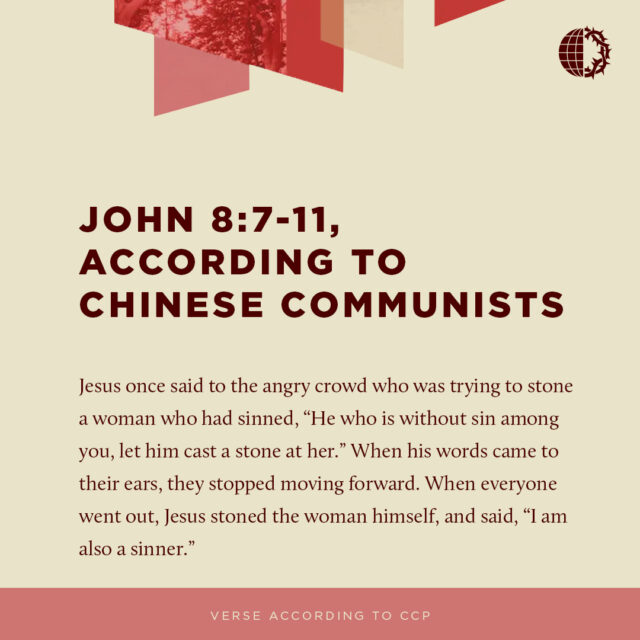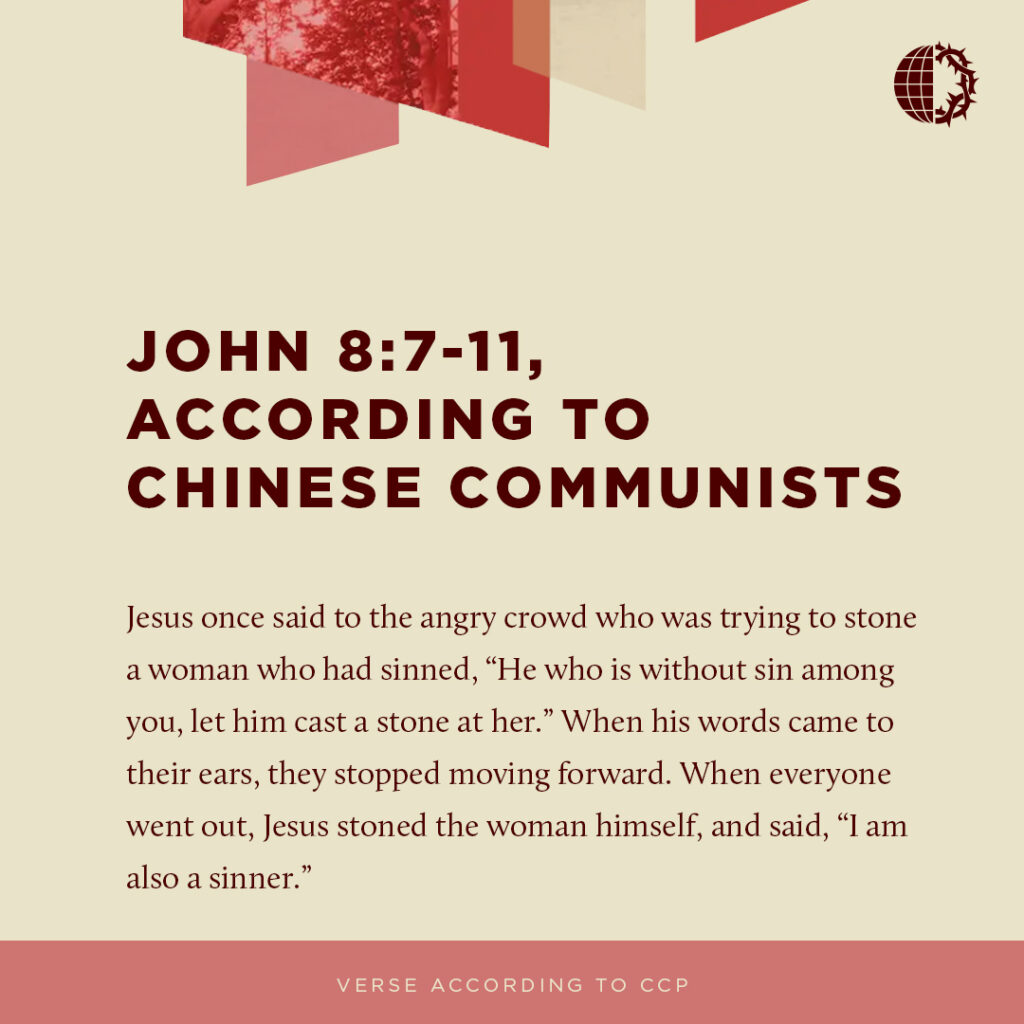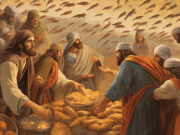
A Shocking Example of a Bible Re-Write
VOM recently shared a reimagined version of the Bible’s revered story centered on Jesus’ love and corrective compassion for a woman caught in adultery.
“The Chinese Communist Party (CCP) announced plans to update the Bible to ‘keep pace with the times.’ The revisions will include adding ‘core socialist values’ and removing passages that do not reflect communist beliefs,” a VOM Facebook post read. “In a textbook for high school students released in September 2020, the authors included a passage from John 8, as revised in their new version.”
Before we explore the revised communist version, let’s look at John 8 as it stands in the genuine and authentic Bible.
As the famous forgiveness story goes, the Pharisees brought a woman caught in adultery before them and challenged Jesus, proclaiming, “Teacher, this woman was caught in the act of adultery. In the Law, Moses commanded us to stone such women. Now, what do you say?”
The Bible notes that these Jewish leaders were “using this question as a trap” to accuse Jesus. Still, Christ started writing on the ground with his finger (it’s a mystery what he was writing) and then uttered some transformational words (verse 7): “Let any one of you who is without sin be the first to throw a stone at her.”
After the people — clearly shaken by Jesus’ words — walked away, Christ and the woman were left standing together, and their exchange went as follows (NIV):
Christ: “Woman, where are they? Has no one condemned you?”
Woman: “No one, sir.”
Christ: “Then neither do I condemn you. Go now and leave your life of sin.”
The Chinese Communist Party, though, reportedly has a different vision for how this interaction unfolded — an anti-biblical, faux account that flies in the face of scriptural truth.
In the Chinese government’s new version — purportedly observed in a textbook published in September 2020 — the crowd disperses, but then the text states, “When everyone went out, Jesus stoned the woman himself, and said, ‘I am also a sinner.’”

BẢN DỊCH: Giê-xu nói với đám đông giận dữ đang cố ném đá một người phụ nữ đã phạm tội, “Ai trong các ngươi là người không có tội, hãy lấy đá ném vào chị ấy trước đi.” Khi họ nghe những lời này thì lần lượt bỏ đi. Khi mọi người đã đi hết, Giê-xu ném đá người phụ nữ đó và nói “Ta cũng là một tội nhân.”
Why is China Re-Writing The Bible?
The transformed language directly aims at Jesus’ divinity, something Nettleton said is quite shocking.
“In one sense, it’s just like so arrogant to think, ‘I’m going to rewrite the story of Jesus’… but then you think about denying the deity of Christ,” he said. “If Jesus is a sinner, then he’s not God.”
For anyone wondering why the Chinese Communist Party would take such troubling steps to try and diminish the Gospel, Nettleton said it has everything to do with control.
nguồn:
Với 130 triệu người theo Cơ Đốc giáo tại Trung Quốc và sự phát triển liên tục của những hội thánh ngầm, hiện nay ở Trung Quốc có nhiều người theo Chúa hơn cả số thành viên của đảng cộng sản Trung Quốc.
Sự đàn áp của chính quyền chỉ khiến cho các hội thánh phát triển mạnh hơn, nên đảng cộng sản Trung Quốc hiện nhắm vào Kinh Thánh, với cái mà họ gọi là “cập nhật” cho phù hợp với “các giá trị xã hội chủ nghĩa”, và xóa bỏ những phân đoạn không phản ánh niềm tin cộng sản.
Tina Ramirez, người sáng lập Hardwired Global, cho biết: “Chính quyền Trung Quốc không còn hài lòng với tất cả những nỗ lực nhằm cố gắng ép buộc những Cơ Đốc Nhân từ bỏ đức tin của mình. Vậy nên giờ đây họ đưa vấn đề lên một tầm cao mới khi cố gắng viết lại Kinh Thánh và thay đổi những gì Kinh Thánh nói, để làm người dân bối rối và ngăn cản họ cải đạo sang Cơ Đốc giáo.“
Một ví dụ từ sách giáo khoa trung học, đảng cộng sản Trung Quốc đã sửa một phân đoạn trong sách Giăng, chương 8, và bóp méo bản ký thuật về phản ứng của Chúa Giê-xu trước người đàn bà bị bắt quả tang phạm tội ngoại tình, trong đó nói thế này:
Giê-xu nói với đám đông giận dữ đang cố ném đá một người phụ nữ đã phạm tội, “Ai trong các ngươi là người không có tội, hãy lấy đá ném vào chị ấy trước đi.” Khi họ nghe những lời này thì lần lượt bỏ đi. Khi mọi người đã đi hết, Giê-xu ném đá người phụ nữ đó và nói “Ta cũng là một tội nhân.”
Bob Fu, chủ tịch của ChinaAid cho biết, “Những chuyện này thực sự đang xảy ra ngay lúc này. Chúng tôi đã chứng kiến sự leo thang. Kinh Thánh dành cho trẻ em hoàn toàn bị cấm. Tất cả các ứng dụng Kinh Thánh cũng như ứng dụng liên quan đến Kinh Thánh đã bị xóa khỏi mọi cửa hàng ứng dụng thương mại điện tử. Hàng triệu trẻ em tin Chúa ở Trung Quốc đã bị buộc phải ký vào một mẫu đơn từ bỏ đức tin của mình ở nơi công cộng.“
“Bản chất của đảng cộng sản Trung Quốc là kiểm soát. Luôn luôn là kiểm soát theo kiểu độc tài“, Todd Nettleton từ mục vụ Voice of the Martyrs nói. “Và họ coi Phúc Âm, thông điệp của Cơ Đốc giáo là thứ gì đó sẽ tước đi quyền kiểm soát của đảng cộng sản. Và vì vậy, bản dịch xã hội chủ nghĩa mới của Kinh Thánh này chỉ là một bước đi nữa của đảng cộng sản Trung Quốc trong việc cố gắng kiểm soát Hội Thánh và khai sinh ra một cơ đốc giáo sai trật được sử dụng như một phương tiện để kiểm soát người dân và phục vụ lợi ích của đảng.“
Nhưng một mục sư Trung Quốc đã nói rằng, “…những nhà cầm quyền đảng cộng sản đã chọn đối đầu với Đấng mà họ không bao giờ có thể bỏ tù. Họ chắc chắn sẽ thua cuộc.“
“Tôi khẳng định với tất cả những người nghe lời tiên tri trong sách nầy rằng: Nếu ai thêm gì vào những lời nầy, thì Đức Chúa Trời sẽ thêm cho người ấy những tai họa đã ghi trong sách nầy. Còn nếu ai bớt điều gì trong các lời của sách tiên tri nầy, thì Đức Chúa Trời sẽ cất lấy phần của người ấy về cây sự sống và thành thánh đã được ghi trong sách nầy.” (Khải-huyền 22:18-19)
Hãy cầu nguyện cho các anh chị em của chúng ta ở Trung Quốc vì trận chiến phía trước của họ rất cam go. Chúa có cách bảo tồn lời chân thật của Ngài cho thế hệ mai sau. Về phần chúng ta là những người đang được hưởng sự tự do (ít nhất là cho đến lúc này), hãy tỉnh thức và cầu nguyện vì thì giờ đã gần rồi!
Dịch & biên tập: Eunice Tu
Nguồn: cbn.com và hoithanh. com
For Discussion. CHAPTER 1. Unmasking Accuser.

.
1.
Our daily conversations will influence our worldview. Here are some
examples:
a. When we talk to an atheist, a Mormon, a Muslim
and so on, if we are not filled with the Word of God and the Holy
Spirit, we will be negatively influenced and impacted by these
pẻople’s views. As a result, our faith in God will be shaken.
b.
Our worldview must be based on the Bible. If our daily conversations
distract us from the Word of God, then they will influence our
worldview. We will no longer see things from God’s perspective.
2.
Each conversation is a seed that is harvested exponentially. This
past week, I shared the God’s Word and participated in discussions
about the Word in a weekly Bible study group. I realized that, “So
shall My word be that goes forth from My mouth; It shall not return
to Me void, But it shall accomplish what I please, And it shall
prosper in the thing for which I sent it.” (Isaiah
55:11).
However, there are other conversations that I have with
those around me. When those around me bring up topics like shopping,
politics, sports, etc… I listen, but then I steer the conversation
in a direction that brings the Word to life. I know that whenever the
Word is shared, the seed of the Gospel is sown.
- How can I guard my heart?
The
Book of Proverbs teaches: .
Above all else, guard your heart,
for
everything you do flows from it. (4:23)
I can guard my heart
by:
“Your word (God’s word) I have hidden in my heart,
That I
might not sin against You” (Psalm 119: 11)
Jesus also taught in
Matt. 15:19, “For out of the heart come evil thoughts—murder,
adultery, sexual immorality, theft, false testimony, slander.”
Therefore, the best way to guard my heart is to study, memorize God’s Word, and regularly apply God’s Word to my daily life every moment.
Chapter 2.
1. Christians can unintentionally work for the devil in the following ways:
Christians think according to their own feelings and do not pay attention to God’s will. For example, the case of Peter in Matthew 16:21-23. This apostle unintentionally spoke according to Satan’s temptation, so he was rebuked by The Lord Jesus Christ, “Get behind me, Satan! You are a stumbling block to me; you do not have in mind the concerns of God, but merely human concerns” (Matthew 16:23).
– Friends came to visit Job, they loved Job. However, their words were just opinions led by Satan. They unintentionally made Job more suffer.
2. While learning to follow God every day, Christians may feel some things contrary to God’s will, but are not willing to submit to God and still live according to their own will – according to their own thoughts, and these thoughts are guided by Satan. For example, my sister spent a lot of money on shopping for clothes. She even bought many expensive clothes that she never uses. She knew that it was against God’s will, but for a year she did it her way. Until one day she realized that Satan was trying to convince her to use the money for unnecessary wrong purposes. Now she has seen the temptation of the devil and learned to surrender to God.
- I used to fall into a situation where I tried to be my own boss. But after a few days, I felt uneasy in my heart. I went to God and confessed my sins. I invited God and put Him the Boss in my life again. And only then I have received peace of God.
Chapter 3.
- God judges us according to our words. Here are some reasons:
What we say comes from our hearts. We are accountable for what we say, and we are accountable for what is in our hearts. Jesus said that “by your words you are justified and by your words you will be condemned” (Matthew 12:37). He was not suggesting that by saying the right words people can be made righteous. Rather, He was explaining to the Pharisees that their words reflected what was in their hearts. Their words would either show that they were righteous, having righteousness in their hearts, or their words would show their unrighteousness. The Pharisees’ words were evidence that they had rejected Jesus. Jesus tells them that they can’t hide what is in their hearts. It shines through for everyone to see.
Matthew 12:37 is a good reminder for all of us to listen carefully and to be accountable for what we say, as our words reflect our hearts.
Jesus illustrates the principle by stating that a tree is known for its fruit. What the tree produces reveals what the tree is really made of (Matthew 12:30). A tree produces fruit according to the kind of tree it is. In the same way, Jesus explains, the mouth speaks from the heart. He calls the Pharisees a “brood of vipers” because they were like serpents who poisoned others. They spoke deceptively and tried to appear good, but what they said and taught was falsehood. Their hearts were not filled with good; thus, what came out of their mouths was not good, either (Matthew 12:34).
2. Read James 5:19-20, “My brothers and sisters, if one of you should wander from the truth and someone should bring that person back, remember this: Whoever turns a sinner from the error of their way will save them from death and cover over a multitude of sins.”
James comes to the conclusion of his letter with a challenge to his readers: make an attempt to bring back those among you who have wandered from the truth. He refers to men and women who were once part of the Christian community who have lost their way. Perhaps he has in mind believers who became spiritually weak. Perhaps these were never true believers in Christ, at all, but merely part of the community. In either case, they’ve wandered away after false ideas.
Reaching out to someone who has wandered from God’s truth, with grace and compassion, is sometimes enough to bring them back into the community. Certainly, James has encouraged prayer for each other, as well as a focus on meeting each other’s practical needs for food and clothing.
In any case, the attempt to reach and restore these sinful wanderers should be made with great love and concern for their souls. James is not speaking of condemnation, judgment, or arrogance. He’s speaking of a sincere interest—a loving effort—to help someone else.
-
Many years ago, I
was expelled from college because of my involvement in missionary
work. At that time, I was a missionary worker in the local
church.
At that time, an elder in the church came and told me the words of life. They were quotes from the Bible. I remember one of the words he quoted: “Though my father and mother forsake me, the Lord will receive me” (Psalm 27:10).
He also added the Word of God in Matthew 5:10, “Blessed are those who are persecuted because of righteousness, for theirs is the kingdom of heaven.”
I have received encouragement from these words. These are the words of life that I have heard.
Chapter
4.
1.
I have been the subject of gossip in church. My immediate reaction was to get angry at the gossip. But after thinking and praying, God’s Word gave me the wisdom to respond appropriately to each situation.
2.
The Hebrew word translated “gossip” in the Old Testament is defined as “one who reveals secrets, one who goes about as a talebearer or scandal-monger.” A gossiper is a person who has privileged information about people and proceeds to reveal that information to those who have no business knowing it.
The Bible tells us that “a perverse man stirs up dissension, and a gossip separates close friends” (Proverbs 16:28). Many a friendship has been ruined over a misunderstanding that started with gossip. Those who engage in this behavior do nothing but stir up trouble and cause anger, bitterness, and pain among friends.
For
the following reasons gossip never keeps the truth true:
– when a
person gossips, he is often subjective and does not have enough
information about his own knowledge. Therefore, what he says is
giving information that is harmful to the listener, or in some cases
pleasing the listener but causing harmful consequences to others.
–
The Bible condemns gossip. Read Proverbs 26:22, “The
words of a gossip are like choice morsels;
they
go down to the inmost parts.”
–
In the New Testament, the apostle Paul teaches in 2 Cor 12:2O, “For
I am afraid that when I come I may not find you as I want you to be,
and you may not find me as you want me to be. I fear that there may
be discord, jealousy, fits of rage, selfish, ambition, slander,
gossip, arrogance and disorder.”
May we all follow the Bible’s teaching on gossip by keeping our mouths shut unless it is necessary and appropriate to speak.
3.
Reading Galatians 5:15, “If you bite and devour each other, watch out or you will be destroyed by each other.” We see that Christians can devour one another through gossip. To say that gossip is “spiritual cannibalizing” is not an exaggeration or a strong statement. It is a fact.
The Jews were engaging in spiritual cannibalism. Many Christians today are guilty of the same thing. Every time you gossip, backbite, criticize or slander a brother or sister in Christ, you are “devouring” them.
Chapter 5.
- Here
are some reasons why offense is inevitable:
– Everyone makes mistakes. And one of the most common mistakes is offense others.
– Satan tempts people to sin and offend each other.
– In a fallen world, offending each other is inevitable.
2. The apostle Paul directs the church in Rome to not be conformed to this world, but be transformed by the renewing of their minds (Romans 12:2). Then, while instructing the church in Corinth on how to engage in the spiritual battle around them, he directs them to take every thought captive to obey Christ (2 Corinthians 10:5).
In a world gone wild, surrounded by the enemies of our soul seeking to distract and destroy us, we desperately need the truths of the gospel applied to our minds daily.
We have to to pay attention to what is going on in our mind.
What are we hearing?
What are we thinking?
What are we believing?
We are constantly being informed by words and ideas, worldviews and philosophies. Our personal stories are filled with disappointment, brokenness, and pain. And our hearts and heads have been informed by lies, deceit, and accusations from the world, the flesh, and the devil.
What happens in our minds is spiritual warfare. Proverbs 23:7 says: “For as he thinks in his heart, so is he.”
I often experience a spiritual warfare taking place in my mind. In every situation I have to make a decision or a choice to walk by the Spirit or walk by the flesh.
- Here are the three important steps to breaking the power of offense:
- Forgive. Read Luke 17:3, “If your brother or sister sins against you, rebuke them; and if they repent, forgive them.”
-
Repent. Read Psalm
51:2,8 “Wash
awayall my iniquity
and cleanse me from my sin … Let me hear joy and gladness;
let the bones you have crushed rejoice.” - Avoid. Read Romans 16:17, “I urge you, brothers and sisters, to watch out for those who cause divisions and put obstacles in your way that are contrary to the teaching you have learned. Keep away from them.”
Chapter 6.
- I
have been offended by someone, and then I turning into offensive
that person.
This was a terrible experience for me as an immature Christian.
A leader in my church offended me and said slanderous, abusive words to me.
I responded with anger and declared that he was a tool of the devil.
In this case, both of us were wrong in the light of the Bible.
The solution to this problem is to control my anger and talk peacefully to him. I can invite an elder in the church to act as a referee to listen to both sides’ views. - Read
Proverbs 6:16-19, “There
are six things the Lord
hates,
seven that are detestable to him:
haughty eyes,
a lying tongue,
hands that shed innocent blood,
a heart that devises wicked schemes,
feet that are quick to rush into evil,
a false witness who pours out lies
and a person who stirs up conflict in the community.” A man who sows discord in the local church is one of the things God hates. A person can cause discord in the church because of ignorance of God’s Word. Note that we can disagree on many issues, but we must maintain unity in the church. The discord in the church looks like: – Members argue with each other about the method of worship, the choice of hymns, the decoration of curtains and so on.
– Members disagree about the method of evangelism.
– How to spend money in the annual church budget.
This comes from the seeds of pride and thinking that one’s views are better than others.
3.
Every church member who moves around is a “vagabond”. Because he does not realize that he is a member of the body of Christ in the local church.
The symptoms of being a spiritual vagabond are:
- He
thinks of himself as superior to others, and disagrees with the
teachings of the pastor of the church.
– He has no spirit of obedience to the leader and often finds faults in others, and then leaves the church, moving to another church. After that the cycle continues.
– He is a wounded person who has never been healed by the love and Word of God.
Chapter 7.
1.
If
I am hurt by a member of my church, I will apply the Word of God in
Matthew 18:15-17 to resolve the hurt.
This means I will speak to
him or her directly in a peaceful manner, seeking reconciliation. If
the person does not listen, I will bring the matter to the pastor and
elders.
And finally, if the person still does not change, I will
bring the problem to the church. At this point, the church will make
the final decision.
I used to do this in the local church.
2.
There are three things I must resolve in my mind if I want to develop a defense against offense:
a/ I will not be offended.
b/ My spiritual condition is more important than my pain.
c/ I will not stay offended.
3.
The Bible does not say it’s wrong to feel emotion – joy, love, anger, frustration, etc. However, emotions are problematic when they are contrary to the Word of God. Christians do not live by their emotions, but on the basis of the Bible.
Chapter 8.
1.
Balak used Balaam to curse Israel. I too fell into this trap of Satan. Many years ago, I was slandered by a leading pastor who said false things about me. Then I cursed him.
Today I realize that my reaction at that time was wrong. I did fall a trap of the devil.
2.
Absalom committed the following sins while dealing with his brother’s crime:
– Killing his brother. Breaking the law of God.
– Not letting his father King David to judge Amnon’s crime.
3.
We can find witchcraft from the pulpit in the church. The witchcraft is also found among the children of God. When Christians curse others – they are using witchcraft.
Chapter 9.
1.
We can assassinate the characters of others by:
Saying negative things against others. For example, condemning and blaming others for their shortcomings. Instead, we can become nurses who care for and heal their wounds. We can pray for God’s blessing and say words of encouragement to others.
2.
We are ready repent and apologize although the other person will not do the same. Because we need to apply God’s Word to ourselves first, regardless of whether others do it or not. Our repentance and apology will bring us peace.
3.
My church and family used to fall prey to the critical spirit. At that time I prayed and asked for God’s grace to carry out my ministry of reconciliation. I know that the churches and families often fall into this situation. These are traps of Satan, and we help each other not to take the devil’s bait.





























